|
|
|
Sort Order |
|
|
|
Items / Page
|
|
|
|
|
|
|
| Srl | Item |
| 1 |
ID:
178207
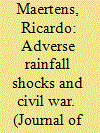

|
|
|
|
|
| Summary/Abstract |
News reports and policymakers frequently link African civil conflicts and wars to agricultural crises caused by droughts. However, empirical studies of the relationship between rainfall and civil conflict or war remain inconclusive. I reexamine this relationship focusing on rainfall over each country’s agricultural land during the growing seasons. I also incorporate that the relationship between rainfall and agricultural output is hump-shaped, as rainfall beyond a threshold decreases output. I find a U-shaped relationship between rainfall and the risk of civil conflict and war in (Sub-Saharan) African countries. This relationship mirrors the hump-shaped relationship between rainfall and agricultural output.
|
|
|
|
|
|
|
|
|
|
|
|
|
|
|
|
| 2 |
ID:
178205
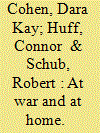

|
|
|
|
|
| Summary/Abstract |
What are the consequences of women dying in combat? We study how women fighting on the frontlines of the military affects public attitudes toward (1) military conflict and (2) women’s equality. We demonstrate through a series of survey experiments that women dying in combat does not reduce public support for war. However, women’s combat deaths do shape perceptions of women’s equality. Women dying in combat increases support for gender equality, particularly in the public sphere of work and politics, but only among women respondents. The findings indicate that women’s combat deaths do not undermine leaders’ ability to garner support for war, but combat service—and indeed, combat sacrifice—alone is insufficient to yield women’s “first-class citizenship” among the general US public. The results highlight how major policy changes challenging traditional conceptions of gender and war can generate positive attitudinal shifts concentrated among members of the underrepresented community.
|
|
|
|
|
|
|
|
|
|
|
|
|
|
|
|
| 3 |
ID:
178210
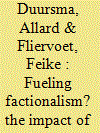

|
|
|
|
|
| Summary/Abstract |
While peace processes increase the likelihood that a civil war is resolved, they can also complicate peace by increasing the risk of rebel fragmentation. In this article, we argue that negotiations exacerbate pre-existing structural and substantial divisions within rebel organizations, therefore increasing the likelihood of a rebel split. More specifically, we put forward a theoretical framework that specifies why factions within a rebel group may disagree with the onset of negotiations, the conclusion of a peace agreement, or the implementation of an agreement—and thus break away during the peace process. We empirically assess the merit of this framework by systematically comparing the impact of these phases in a peace process on the fragmentation of rebel organizations. Using data that more accurately reflect the moment a rebel split takes place than earlier studies, we find that peace processes have a greater substantial impact on rebel fragmentation than previously assumed.
|
|
|
|
|
|
|
|
|
|
|
|
|
|
|
|
| 4 |
ID:
178211
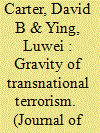

|
|
|
|
|
| Summary/Abstract |
Transnational terrorism is an inherently international phenomenon as it involves attacks where the perpetrators are from a different country than the victims. Accordingly, a growing literature explains patterns in transnational attacks with a focus on international variables, for example, the presence of a border wall or alliance patterns. Despite the importance of the topic, no common empirical framework with theoretical basis has emerged to analyze the flows of transnational attacks. We propose that recent versions of the structural gravity model of transnational flows, long the workhorse model in trade economics, can be modified to provide a theoretically motivated model of the flows of transnational terrorist attacks among countries. The gravity model provides several empirical advantages for the study of international variables and transnational terrorism, for example, recent specifications allow the researcher to estimate count models that condition out all time-varying country-level confounders with fixed effects. This facilitates sidestepping the typical problem that any international variables associated with transnational flows are often correlated with omitted or imprecisely measured domestic factors, which draws their estimates into question. Moreover, we demonstrate that the structural gravity model does a much better job in predicting outcomes, particularly when multiple attacks flow across borders.
|
|
|
|
|
|
|
|
|
|
|
|
|
|
|
|
| 5 |
ID:
178208


|
|
|
|
|
| Summary/Abstract |
How does the presence of multiple combatants affect rebel groups’ ideological and demand positioning? Although violent forms of inter-group conflict have been widely studied in the civil war literature, rebel groups’ strategic use of ideology and demands has received scarce scholarly attention. We argue that the pressure of competition forces rebel groups to differentiate themselves ideologically and demand-wise from their rivals to maximize their chances of survival and success. Rebel groups strive to set themselves apart by offering unique products to their supporters and recruits. Thus, we contend that rebel groups are more likely to modify their ideologies and demands from the government in the face of competition from rival groups. We test this theory using novel data collected from rebel group manifestos and public statements. Our findings suggest that groups are more likely to shift their ideology and modify their demands as the number of rival groups increases.
|
|
|
|
|
|
|
|
|
|
|
|
|
|
|
|
| 6 |
ID:
178206
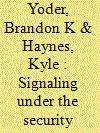

|
|
|
|
|
| Summary/Abstract |
One of the most intractable debates in IR revolves around the severity and frequency of the security dilemma. Offensive realists argue that states are compelled to make worst-case assumptions about each other’s intentions, which yields inexorable competition and conflict even between mutually-benign actors. Yet others have argued that rational benign states should always be able to find cooperative signals that are costly enough to be credible, but not too costly to risk sending. If true, this should alleviate the security dilemma and facilitate cooperation, even under high initial distrust. However, there is little empirical work on interstate reassurance and the conditions under which mutually-benign actors can build trust. We address this gap using laboratory experiments to test Andrew Kydd’s canonical model of the security dilemma. We find strong support for the directional effects of the hypothesized signaling mechanisms. However, the frequency of cooperation is significantly lower than the model predicts, and the feasibility of reassurance is highly sensitive to the degree of prior trust. This implies that although reassurance can mitigate the security dilemma, offensive realism may still capture important psychological mechanisms that impede interstate cooperation.
|
|
|
|
|
|
|
|
|
|
|
|
|
|
|
|
| 7 |
ID:
178209


|
|
|
|
|
| Summary/Abstract |
Do human rights organizations (HROs) aid the consolidation of democracy in post-authoritarian states? It is often argued that these groups contribute to accountability for past repression. Yet HROs can have unintended consequences if they threaten the interests of powerful domestic institutions. This paper develops a simple model of human rights activism in post-authoritarian states. Civilian governments in these states trade off support from the military and human rights activists which seek to punish the military. Counterintuitively, the model predicts human rights activists make amnesty for the military more likely, as activists tempt the government to punish the military and the military becomes more likely to intervene in politics. The model’s implications are tested using a sample of post-authoritarian states from 1970-2010. Results show that more HRO influence increases the likelihood of amnesty laws and military involvement in government, though HROs may achieve justice through pathways such as truth commissions.
|
|
|
|
|
|
|
|
|
|
|
|
|
|
|
|
|
|
|
|
|